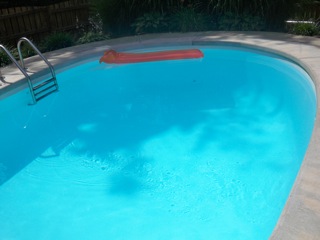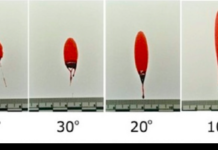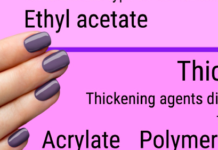“Wow, my eyes are stinging!”says a swimmer at the local pool.
“My skin is itchy!” says another swimmer.
Sound familiar? It’s hot, humid, and sunny. Everyone heads for the local swimming pool to cool off and have a little fun in the sun. But the chlorine used to keep the water safe can be a big problem for many. As a result, many pool owners, and some community pools, are converting to a salt water system to avoid chlorine.
“In five years everyone will have saltwater pools, except for the eccentric [who don’t like change],” says Bob Brooks of R&S Pool & Spa of Maryland Heights, MO, a 34-year veteran in the pool business. “The trend to saltwater began three years ago, and has doubled every year.”
In the U.S., it is estimated that the total number of swimming pools is 8.6 million, according to a 2007 study by MarketResearch.com, one of the world’s largest marketing research institutions. MarketResearch.com also estimates that the swimming pool market will top $3.8 billion for pool equipment and maintenance by 2011.
Traditionally, pool waters are treated with chlorine in the form of calcium or sodium hypochlorite, the same as the bleach used in your washing machine. The chlorine is released as the hypochlorite salt dissolves in the water. Hypochlorous acid (HClO) is the result, which kills off any bacteria or germs in the water.
“Swimmers often mistakenly blame red eyes, itchy skin and a strong chemical smell of pool water on ‘too much chlorine’,” according to the American Chemistry Council, a chemical manufacturing organization. Chloramines are the real culprit for those weepy eyes and itchy skin, says the Council. When chlorine is mixed with the body oils, lotions, spit and urine, chloramines are formed.
On the other hand, a salt water pool, which is only about 10% as salty as the ocean, eliminates the eye irritation and skin problems, claims Pentair, a manufacturing company for chlorine generators. Moreover, the water is “soft” to the touch and doesn’t have the odor associated with the usual chlorinated pools, says Pentair.
A salt water pool uses regular table salt, NaCl, to get the chlorine. The salt concentration is roughly 2800–3600 parts per million (ppm) according to Pentair, compared to the ocean at about 35,000 ppm, according to Windows to the Universe, a website supported by NASA with coverage of Earth and Space sciences. A chlorine generator uses electrolysis, passing electricity through the water, to break down the salt and form chlorine, as hypochlorous acid, to disinfect.
Brooks states that the cost for a traditional chlorinated pool is approximately “$120 per year for the chlorine and another $120 per year the chlorine shock needed to keep it up”, whereas the cost for salt for the generator is “$100 at the beginning, and between $40–50 per year afterward.”
The only downside is the cost of the generator, which is approximately $1000. Nevertheless, Brooks says that he has sold “120–130 [generators] so far this year.” With the savings from converting to salt, the money for the chlorinator is recovered within a few years, he adds.

This work is licensed under a Creative Commons Attribution-NonCommercial-NoDerivs 3.0 Unported License














I didn’t know about this trend. Now I’m wondering why salt wasn’t initially used for home pools…I’m guessing the technology for these generators is new? Does the lower level of chlorine produced, and thus introduced into the water treatment system when pools are drained, yield a reduced environmental impact?
I don’t think it is all that new, overall, but probably based on cost. I am just assuming. When we initially built our pool, the generator was 1300 to 1500 dollars. Prices already lower!
Does this work for hot tubs? I am interested in this technology. Thank you!
Not really…the temperature is too high, causing different reaction. Wish it did, however!
Yes! It still produces the same reaction, just introduced a different way. It just doesn’t have the issue with the chloramines…weird huh?
:flag
seems like a good idea to me because usually whenever i go swimming my sister always complain about the water and with out all the chemicals in the pool that causes irritation it would be a lot better. I just wonder i fsalt water is actually a good idea because if it was a good idea we probaly woud’ve used that suggestion in the first place
This made me think about why we didnt use salt water in the first place. also does salt water have the same affects on the germs. also i was wondering does the itchy skin and irritated eyes have to do with the amount of chlorine. this is goof article and very informative.
I am a year round competitive swimmer and many of our pools have switched from chlorine to salt water pools. I also have noticed this trend with many personal pools. For example my Grandma just converted her pool from chlorine to a salt water pool. While swimming in salt water pools I do have a more pleasant experience, I am able to open my eyes without them burning and my skin does not feel as dry. However, I am wondering if salt water pools kill the same amount of bacteria as chlorine does. I am also wondering if a salt water pool kills the bacteria as fast as chlorine does and if salt water pools can handle a high amount of people swimming in them.
Wow! I never knew that it was not just the chlorine that cauesed red eyes and itchy skin but rather the chloramines. Peole say they are less affected by salt water pools. Is this because there is less chlorine because of chlorine generators??
This is so interesting! I know many people who have recently transfered to salt water pools and are extremely happy with the result. Who came up this technology? It is such a good idea and a great way to save money. In my opinion, it results in a much better swimming experience.
this is a very interesting article that i can really relate to! when I go swimming in chlorinated pools my eyes get very irritated. I think it would be fun to do an experiment on the cleanness of the water with both chemicals:ak
I never knew that the eye irritation and skin problems from swimming in chlorinated pools was actually from the chloramines and that salt-water pools would prevent this! I also didn’t know that so many pools had converted to salt-water pools. Would salt-water pools kill the bacteria as effectively though?
I found this article very interesting! As a swimmer, and having a chlorinated pool at my house, I could absolutely relate. I had no idea that the eye irritation one gets when swimming with their eyes open is not due to the actual chlorine, but from the product created when body oils etc. join with the chlorine. I also find it interesting that you can purchase a generater for your salt water pool that separates the sodium from the chlorine. I wonder what the longevity of a chlorinator generator is compared to a regular chlorine pool filter.
I never knew that you could make an effective form of Chlorine without the use of chlorine. :why I think it would be safer and people could enjoy swimming more without the red eyes and itchy skin.
I guess but is salt water good for your eyes anyway?
I think it’s alot better and saftey to use table salt then chlorine. Because it will create less problems while you’re trying to swim and enjoy yourself and easyier to clean up to.
i feel that this is a very good idea in technology it would be like a new way to save Chlorine but i wonder if it will cause different reaction to people skin?
This was a great article i think the salt will be better than the chlorine it may cause less irration.
isnt’ salt walter pools dangerous because if you open your eyes tthe’ll burn
i think salt is better rather then chlorine because chlorine burns somtimes and salt water you could just wash off
this topic is very interesting i didnt know all these things about salt waater…
Wow, i had no idea about the benefits from salt water, opposed to chlorine. Reading this, it seems that chlorine in pools should be non existent anymore.
I should have commented earlier, sorry! Teaching gets in the way…Saltwater pools do not affect your eyes at all. In fact, it feels just fine! It is not at all like the ocean. Don’t forget that your eyes/body have saltwater anyway! Also, we have had the pool for 5 years this summer, and no one has had any skin issues. My oldest daughter has eczema, and it actually helps. Lastly, I don’t know the longevity of the generator off-hand, but so far so good! Considering the amount of money spent on a chlorinated pool, this pool is practically nothing!
I decided to read this article because last summer I swam in a pool that consisted of salt water. I wondered why the water felt softer than it usually did because of the salt. I personally prefer the salt water over the chlorine normally used in pools. Good article!
I spent an hour in a saline pool for a water aerobics class. After taking a shower there I saw I had an ugly red blotchy rash on my right chest near my collarbone and also along my midriff. It faded away after an hour and a half. I found out that they also put chlorine in the saline pool!! My swim suit reeked of chlorine even after I rinsed it out in water. What caused the rash? Using saline and too much chlorine in the pool?
The thing people are missing is that they are just using the salt in the water to create Bleach, “sodium hypochlorite”, The chloramines come from a reaction when ammonia a nitrogen combine with the chlorine. Most states that allow the use of salt to generate Chlorine require a supplemental bleach pump to maintain state health code minimums.